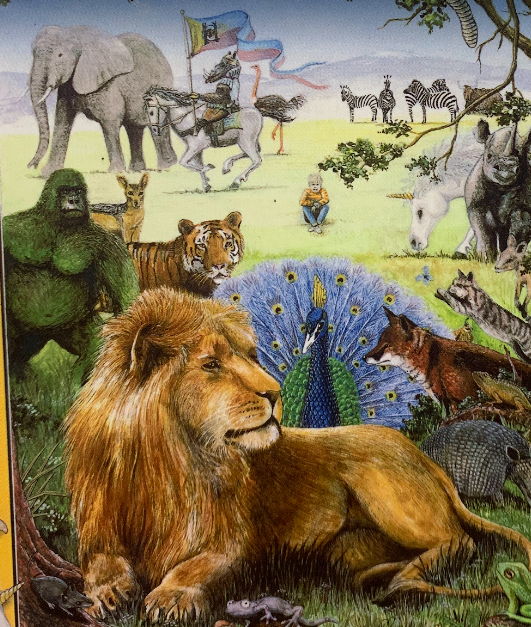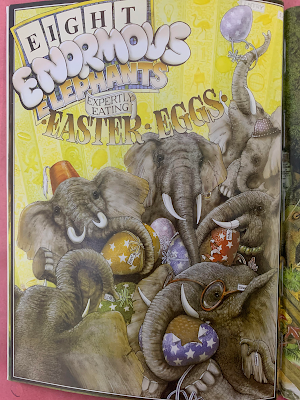That's the Esperanto name for Humpty Dumpty. Some of you may have read in Martin Gardner that it's Homito Omleto and means "Little-Man Egg" -- which spoils the rhyme, incorrectly uses the passive past participle affix as a diminutive, and somehow misses the very obvious fact that omleto means "omelette," not "egg." (I guess an especially big omelette would be an omlo.) So the next time you hear someone casually mention Humpty's non-existent brother Homito, I hope you set them straight. We must each do our part to stop the spread of violent misinformation about what Humpty Dumpty is called in Esperanto.
⁂
Thinking about my recent griffin syncs led me to Lewis Carroll. I remembered that a Gryphon (the same spelling used in
The Tinleys) featured in
Alice but couldn't remember the context. Looking it up, I found that he appears together with the Mock Turtle, with whom he demonstrates the Lobster Quadrille song and dance.
⁂
Shortly after looking up the Gryphon in
Alice, I checked William Wright's blog and found that his latest post was about Lewis Carroll: "
Humpty Dumpty and the Fall of Pharazon," which has since been followed up with an other Humpty post, "
Urkel, Alice, Humpty, and Physiognomy." (And yes, I'm the unnamed emailer who introduced him to the word
physiognomy. Singing "Physiognomy -- I Am Doing It," adapted from a Mormon children's song about genealogy, used to be a running joke in my circle of friends.)
"Humpty Dumpty" was originally a riddle, the answer being "an egg," but it's a pretty bad riddle. I mean, why did he sit on a wall? Do eggs sit on walls? How would an egg come to be in such a precarious position in the first place? It has a certain amount in common with another well-known pseudo-riddle: "If a rooster lays an egg on the top of a barn roof, which way does the egg roll?"
William's post dealt rather extensively with the subject of Humpty Dumpty's belt (or cravat, as the case may be). This made me think of a dad-joke (I literally heard it from my dad), which I left in a comment:
What did zero say to eight?
Nice belt.
William left a reply to the effect that in Through the Looking Glass it is actually "eight" (Alice, in her eighth year) who compliments "zero" (the zero-shaped Humpty) on his belt.
⁂
Another thing I've been thinking about these days is the three gods who are trapped inside Donchatryan Peak by the griffin in
The Tinleys: Zlalop the wind god, Dinderblob the sea god, and Luppadornus Glamgornigus Simbosh the god of herpetology. Herpetology is about reptiles and amphibians, which made me think Luppadornus might have something to do with Kek, the ancient Egyptian frog god whose
cult enjoyed an unexpected revival in 2016.
⁂
Just after reading William's first Humpty post and thinking about an egg sitting precariously on the edge of a wall, ready to fall, I picked up a book I have been reading, John Keel's 1970 UFO classic Operation Trojan Horse. The very first paragraphs I read were these two:
Like the prophet Daniel, and Joseph Smith of the Mormons, Senhor Aguiar passed out. The next thing he knew, he was slumped over his motorcycle, and the UFO was gone. But clutched in his hand was a piece of paper bearing a message in his own handwriting: "Put an absolute stop to all atomic tests for warlike purposes," the message warned. "The balance of the universe is threatened. We shall remain vigilant and ready to intervene."
"The balance of the universe . . ." It's a very odd coincidence how this same phrase turns up over and over again in the stories of these "kooks and crackpots."
It was actually that word crackpot that made me think of Humpty Dumpty falling and cracking. With that image in mind, "The balance of the universe is threatened" took on a different meaning. I imagined the universe as an egg, precariously balanced atop a wall, ready to fall if that balance is threatened.
The universe as an egg -- isn't that an Orphic symbol? The Cosmic Egg? I looked it up on Wikipedia and found that it is a very widespread symbol, not distinctively Orphic. This summary of the Egyptian version got my attention:
The cosmic egg myth can be found from Hermopolitus [sic]. Although the site, located in Middle Egypt, currently sports a name deriving from the name of the god Hermes, the ancient Egyptians called it Khemnu, or "Eight-Town." The number eight, in turn, refers to the Ogdoad, a group of eight gods who are the main characters in the Hermopolitan creation myth. Four of these gods are male, and have the heads of frogs, and the other four are female with the heads of serpents. These eight existed in the primordial, chaotic water that pre-existed the rest of creation. At some point these eight gods, in one way or another, bring about the formation of a cosmic egg, although variants of the myth describe the origins of the egg in different ways. In any case, the egg in turn gives rise to the deity who forms the rest of the world as well as the first land to arise out of the primordial waters, called the primeval mound.
So the Cosmic Egg is associated with the number eight, as in the dad-joke. The eight gods have the heads of frogs and serpents -- herpetology -- and one of the four frog-headed ones is, you guessed it, Kek. Furthermore, the Egg leads to the creation of "the primeval mound," which rises "out of the primordial waters." This sounds like the griffin's mountain in The Tinleys, which is an island.
⁂
After writing the above, I returned to Operation Trojan Horse -- still in the chapter titled "You Are Endangering the Balance of the Universe!" -- and read this:
Later that very night another farmer, John Trasco of Everittstown, New Jersey, reportedly went outside to feed his dog, King, when he saw a brightly glowing egg-shaped object hovering above the ground near his barn. A weird "little man" stepped timidly toward him, he said. He was about 3.5 feet tall, had a putty-colored face with large bulging froglike eyes, and was dressed in green coveralls.
"We are a peaceful people," Trasco quoted the little man as saying in a high "scary" voice. "We don't want no trouble. We just want your dog."
A "little man" in an "egg-shaped" craft syncs with Martin Gardner's "Little-Man Egg." The object hovers near a barn, which syncs with the rooster riddle I mentioned. The man has "froglike eyes," like Kek. (Note, shadilay means "spaceship.") He speaks in double-negatives ("We don't want no trouble"), like the Gryphon in Alice ("they never executes nobody," "he hasn't got no sorrow"). Finally, there's a dog named King. Little-Man Egg doesn't want "King's man," the farmer, nor is he interested in horses or other livestock; he only wants King himself.
Most Mormons will have heard at one point or another Vaughn J. Featherstone's theological reading of "Humpty Dumpty," from a
1995 sermon:
There is a verse that all of you have heard:
Humpty Dumpty sat on a wall,
Humpty Dumpty had a great fall;
Couldn’t put Humpty Dumpty together again.
But the King could, and the King can, and the King will if we will but come unto him.
⁂
Did you notice the passing reference to Joseph Smith in the first John Keel quote above? The dream that started this whole griffin thing was paired with a dream about Joseph Smith. (See "
A vulture named Odessa Grigorievna, and Joseph Smith in a spider mask.") In this latter dream, Smith had hidden a treasure in the basement of his house, but no one else knew about it. Since griffins are also traditionally guardians of treasure, specifically of gold, it seems likely that the two dreams are to be interpreted together.
A box without hinges, key, or lid,
Yet golden treasure inside is hid.
In the story related by Keel, a Brazilian man (whom Keel compares to Joseph Smith) receives the message, "The balance of the universe is threatened. We shall remain vigilant and ready to intervene." In my 2021 post "
Notice: A new FAKE Mormon prophet in Brazil," I discuss a Brazilian man who claims to be the new Joseph Smith, and one of the evidences I give against his claims is his use of the word
vigilantes to refer (in a supposedly revealed English translation) to the Watcher angels from the Book of Enoch. These Watchers have come up in connection with my dreams, in "
Tin soldiers and griffins," because they are called
Grigori in the Slavonic Book of Enoch, and the griffon vulture in my dream is hiding the fact that she is the "daughter of Grigori."
⁂
In "
Armored vultures and Cherubim," I note the possible etymological link between
griffin and
cherubim and point out that "Just as a griffin's role is typically to protect treasure, the biblical Cherubim protect the Tree of Life." The egg may symbolize hidden treasure, and this treasure may be the Tree of Life.
Jumping back to the discussion of Hometo Omleto with which I opened this post, I mentioned parenthetically that perhaps a very large omelette would be called omlo in Esperanto. Just as hometo is from homo, "man," with the diminutive affix -et-, so omleto could be (incorrectly) analyzed as the diminutive of the non-existent word *omlo.
Having acquired the habit from William Wright, I decided to check in omlo meant anything in Elvish. The best fit is the Gnomish word omlos, meaning "chestnut tree." Chestnut tree! Keep in mind that egg = treasure = Tree of Life. In Joseph Smith Senior's 1811 dream of the Tree of Life (which closely parallels the visions of Lehi and Nephi), he describes the tree thus:
It was exceedingly handsome, insomuch that I looked upon it with wonder and admiration. Its beautiful branches spread themselves somewhat like an umbrella, and it bore a kind of fruit, in shape much like a chestnut bur, and as white as snow, or, if possible whiter. I gazed upon the same with considerable interest, and as I was doing so the burs or shells commenced opening and shedding their particles, or the fruit which they contained, which was of dazzling whiteness. I drew near and began to eat of it, and I found it delicious beyond description.
⁂
What a tangled web of syncs! Even writing about it in a linear fashion has been a challenge. Making any coherent sense out of it is going to take some time.


















